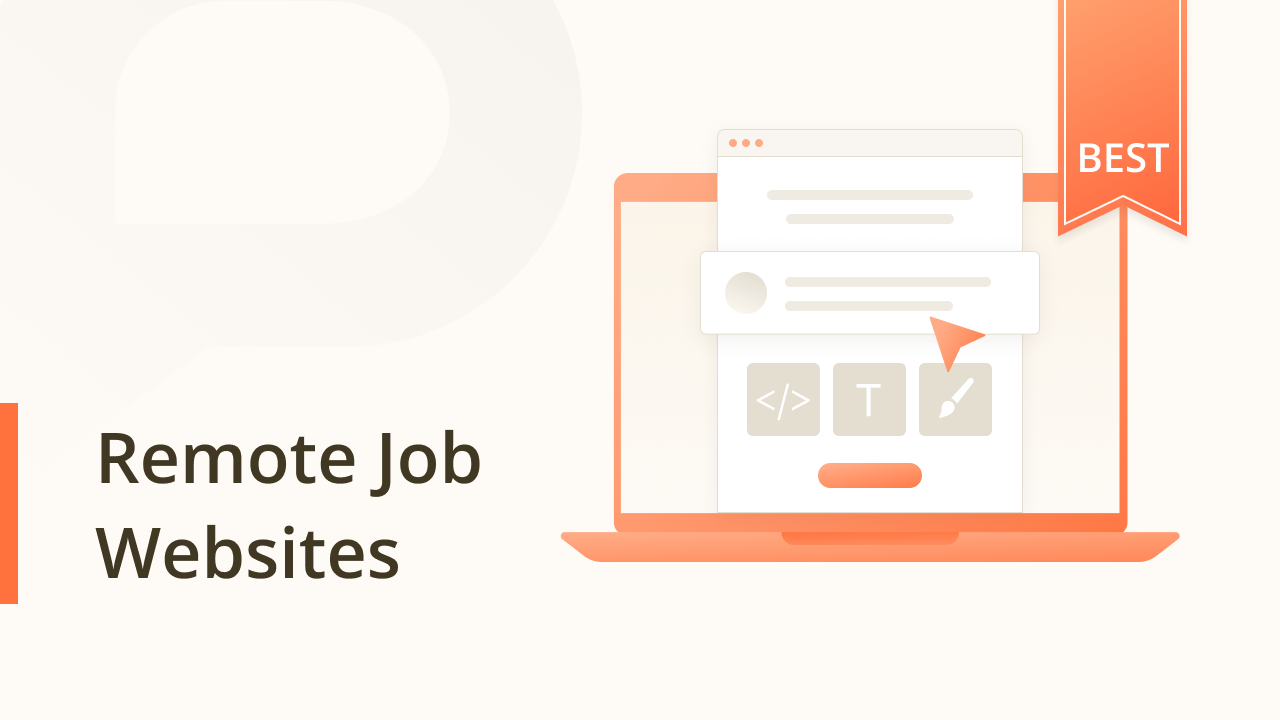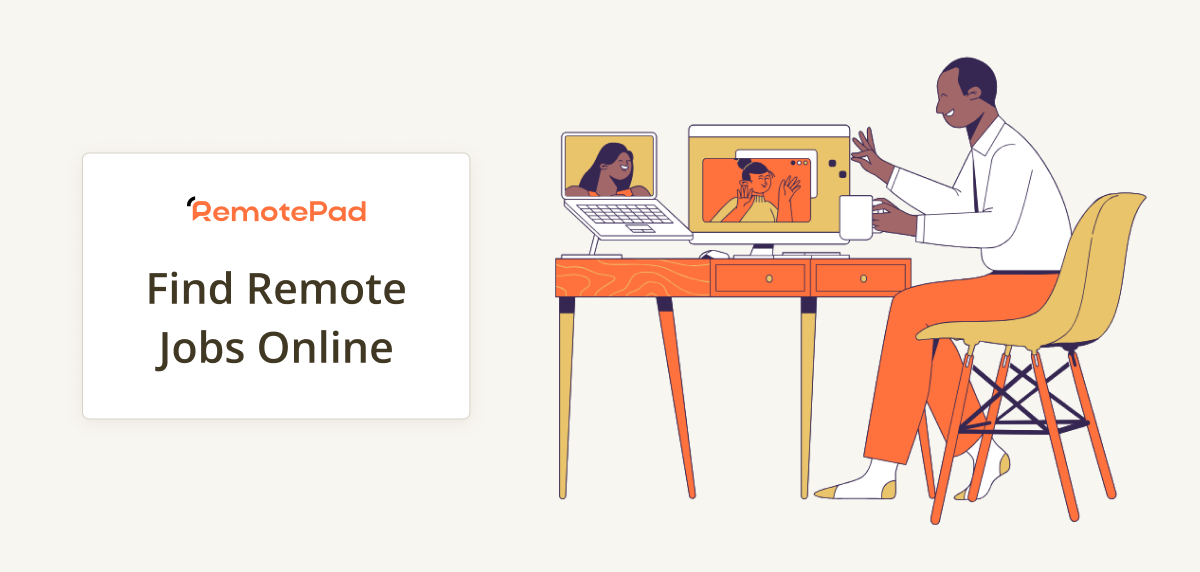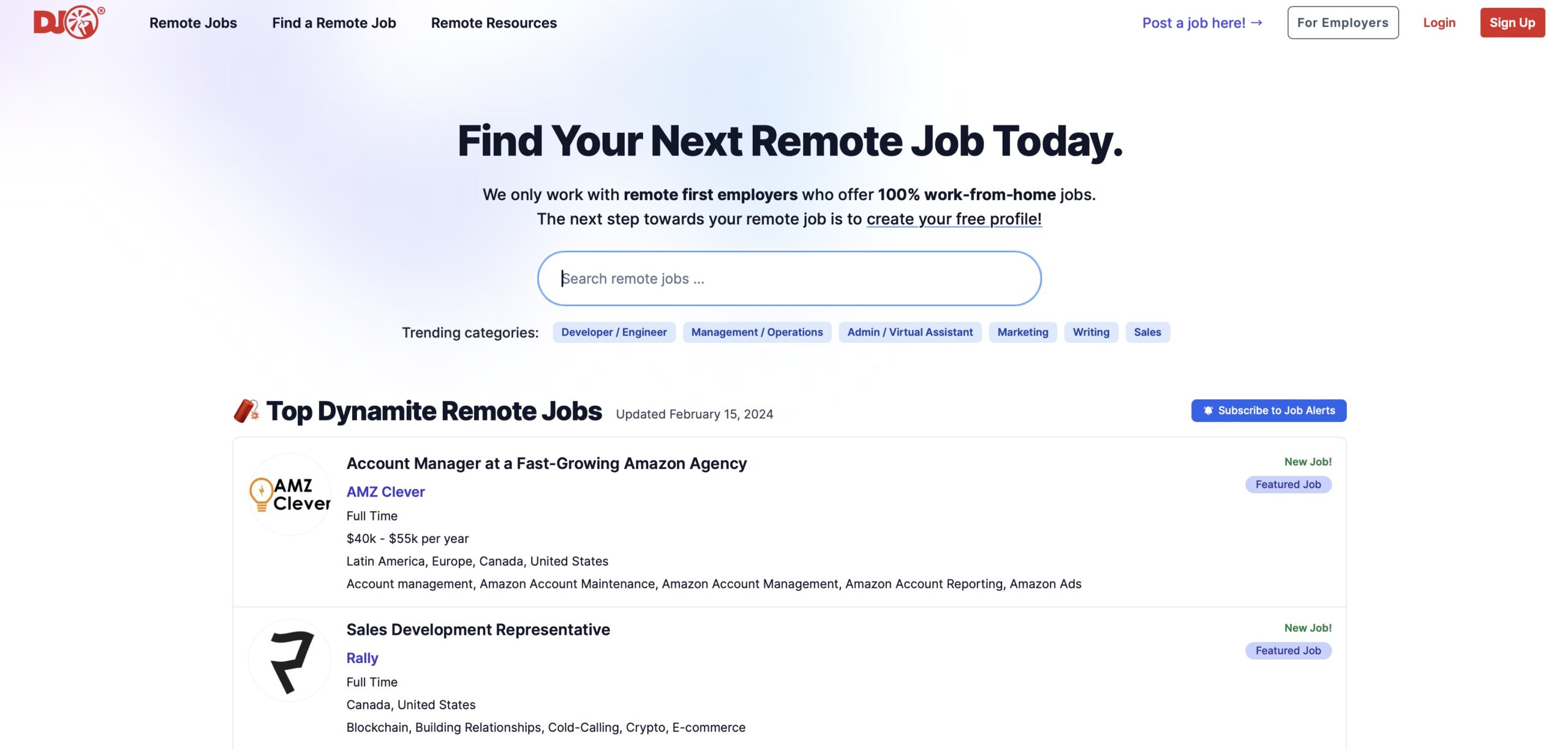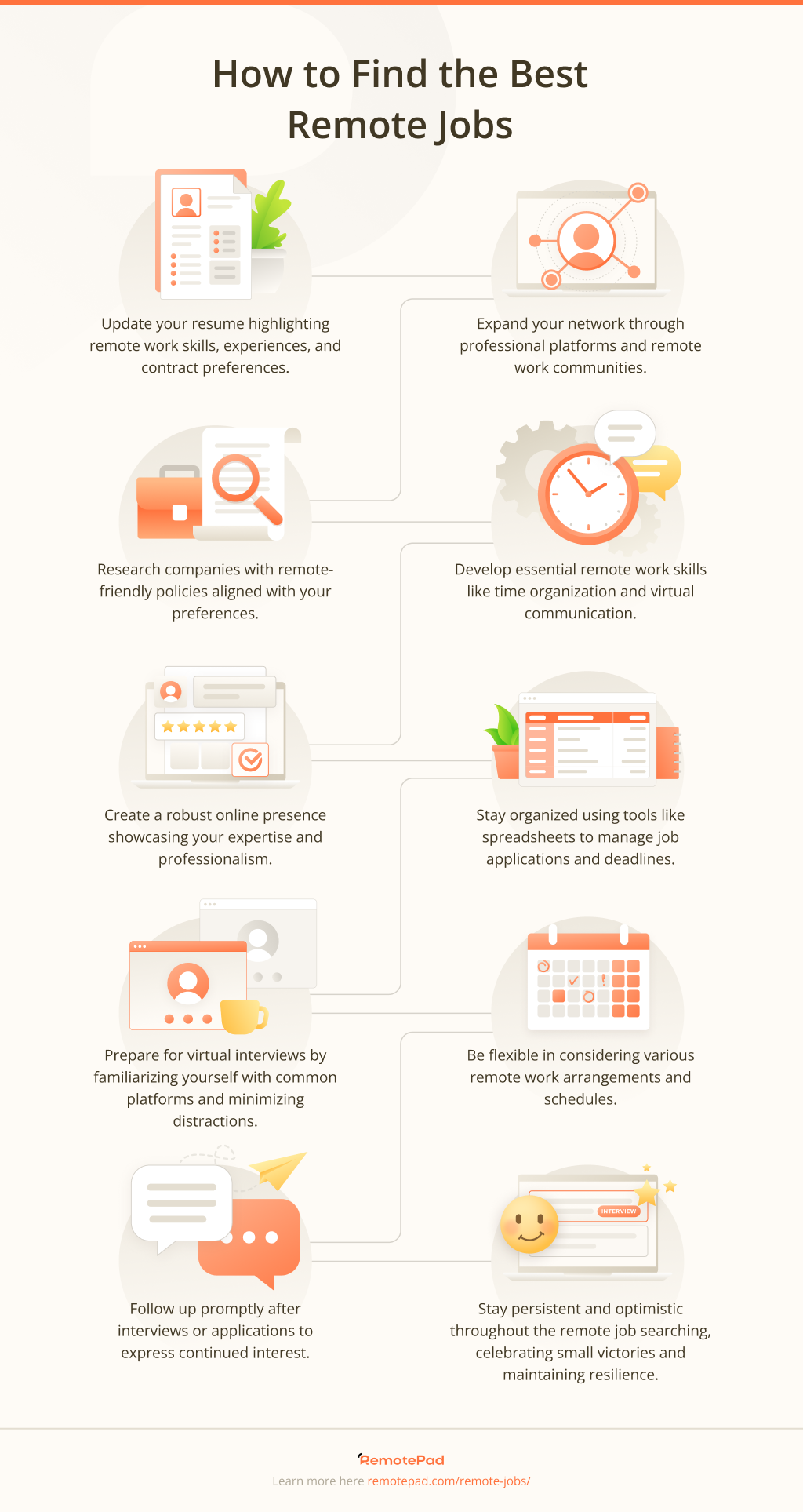Table of Contents
showSpending too much on recruitment, payroll or global HR?
We help you find the Best Providers at the lowest cost.
Don’t know where to begin your remote job search? Don’t worry! We’ve covered you with a curated list of the best remote job websites, freelance platforms, niche job boards, and top companies actively hiring remote workers.
Key Takeaways
- Discover the five best remote job boards for 2024, plus niche sites and companies actively hiring.
- Consider niche sites and freelance marketplaces looking for
full-time or part-time remote jobs in specific industries or contract work.
Remote work is rapidly growing and has increased appeal due to economic downturns and the post-pandemic normalization of working from home.
Are you looking for a remote job, or are you a company looking for the best sites and platforms to hire a remote team?
Read our in-depth guide—including our rundown of the best remote job boards in 2024—to review the most popular avenues for finding remote jobs.
Best Remote Jobs
The best remote jobs offer flexibility, align with personal skills and interests, and provide opportunities for growth while ensuring work-life balance.
| Job Title | Average Annual Salary | Expected Job Growth | Required Skills | Examples of Remote-Friendly Companies |
| Web Developer | $108,000 | 27% | HTML, CSS, JavaScript, React, Python | Google, Amazon, Microsoft, IBM, Accenture |
| Software Engineer | $112,970 | 25% | Java, C++, Python, C#, SQL | Apple, Facebook, Google, Amazon, Microsoft |
| UX/UI Designer | $107,550 | 22% | Design software (Figma, Sketch), Adobe Creative Suite, user experience, user interface | Airbnb, Google, Apple, Amazon, Microsoft |
| Project Manager | $107,520 | 24% | Time management, communication, organization, problem-solving | Apple, Google, Amazon, Cisco, IBM |
| Business Analyst | $94,630 | 16% | Analytical thinking, problem-solving, communication, and presentation skills | Deloitte, Accenture, IBM, PwC, Capgemini |
| Content Writer | $64,550 | 27% | Strong writing skills, grammar, punctuation, research | HubSpot, Upwork, Fiverr, Indeed, LinkedIn |
| Digital Marketing Specialist | $63,250 | 22% | Social media marketing, SEO, PPC, email marketing, content marketing | Google, Facebook, Instagram, LinkedIn, Amazon |
| Customer Service Representative | $39,780 | 12% | Excellent communication skills, empathy, patience, problem-solving | Amazon, Apple, Microsoft, Google, Dell |
| Virtual Assistant | $51,070 | 27% | Organization, time management, communication, project management | Zirtual, Fancy Hands, Upwork, Fiverr, LinkedIn |
The Best Remote Jobs Sites for 2024
Navigating the remote job market can be overwhelming – especially with the number of job sites for remote jobs nowadays – but we’re here to help. We’ve handpicked the best remote job sites that specialize in listing remote positions, making finding your dream job easier. These job boards cater to various industries and offer numerous remote job opportunities, including overnight remote jobs, saving you time and effort in your search.
Top 6 Remote Job Boards
| 1. Remote.co | Remote.co is a leading generalist remote jobs platform that advertises roles in every industry. It also provides helpful resources for those new to remote recruitment and onboarding. 💡 Free for job seekers. Pricing for employers is $299 per post for 30 days. |
| 2. FlexJobs | FlexJobs stands apart from other job sites by extensively vetting job listings to ensure legitimacy. This ensures a premium service connecting job seekers with remote and flexible jobs. 💡 Job seekers by subscription-only at $14.95 per month. |
| 3. WeWorkRemotely | WeWorkRemotely has the largest number of remote jobs available in the industry. With an established reputation in the field, We Work Remotely is your reliable virtual hiring partner. 💡 Free for job seekers. For employers. Job ads cost $299-$449, depending on visibility sought. |
| 4. Dynamite Jobs | Dynamite Jobs is an international remote jobs board serving a remote talent marketplace. With a native applicant-tacking system, it supports you throughout your remote recruitment cycle. 💡 Free for job seekers – $399-645 for advertisers, depending on add-ons |
| 5. Remote Talent (by Remote.com) | Remote.com, through its ‘Remote Talent‘ service, is the only remote jobs platform offered in conjunction with a complete HR outsourcing and Employer of Record (EOR) solution. 💡 Free for all those who sign up to the platform. |
| 6. HireBasis | HireBasis is an international remote job board that connects job seekers with potential employers worldwide. It allows companies to post recruitment details and find top professionals interested in their positions (especially in tech). 💡 Free for job seekers. |
As each job board has pros and cons, we look in depth at each site’s offerings.
1. Remote.co
Remote.co, founded by Sara Sutton, is a remote job board exclusively featuring remote positions. They offer a diverse range of remote roles, including:
- Entry-level positions
- Freelance positions
- High-paying positions
- Part-time positions
From Canada to Cyprus, Uganda to Ukraine, and a thousand places in between, these positions are available in various job categories, such as data entry, teaching, and healthcare. This would be perfect for digital nomads, such as content creators specializing in photo and video editing, as they are always on the move and usually need multiple projects to work on at a time.
Whatever your skill level or desired work arrangement, a quick search will reveal that Remote.co has something for you.
In addition to their remote job listings, Remote.co provides supplementary resources such as a WFH blog and Q&A section (and you will often find it updated just hours ago), which can help you navigate the remote work landscape more effectively. Remote.co aids your job hunt by bringing more jobs to the remote worker community while providing the necessary knowledge and insights to thrive in remote work.
2. FlexJobs
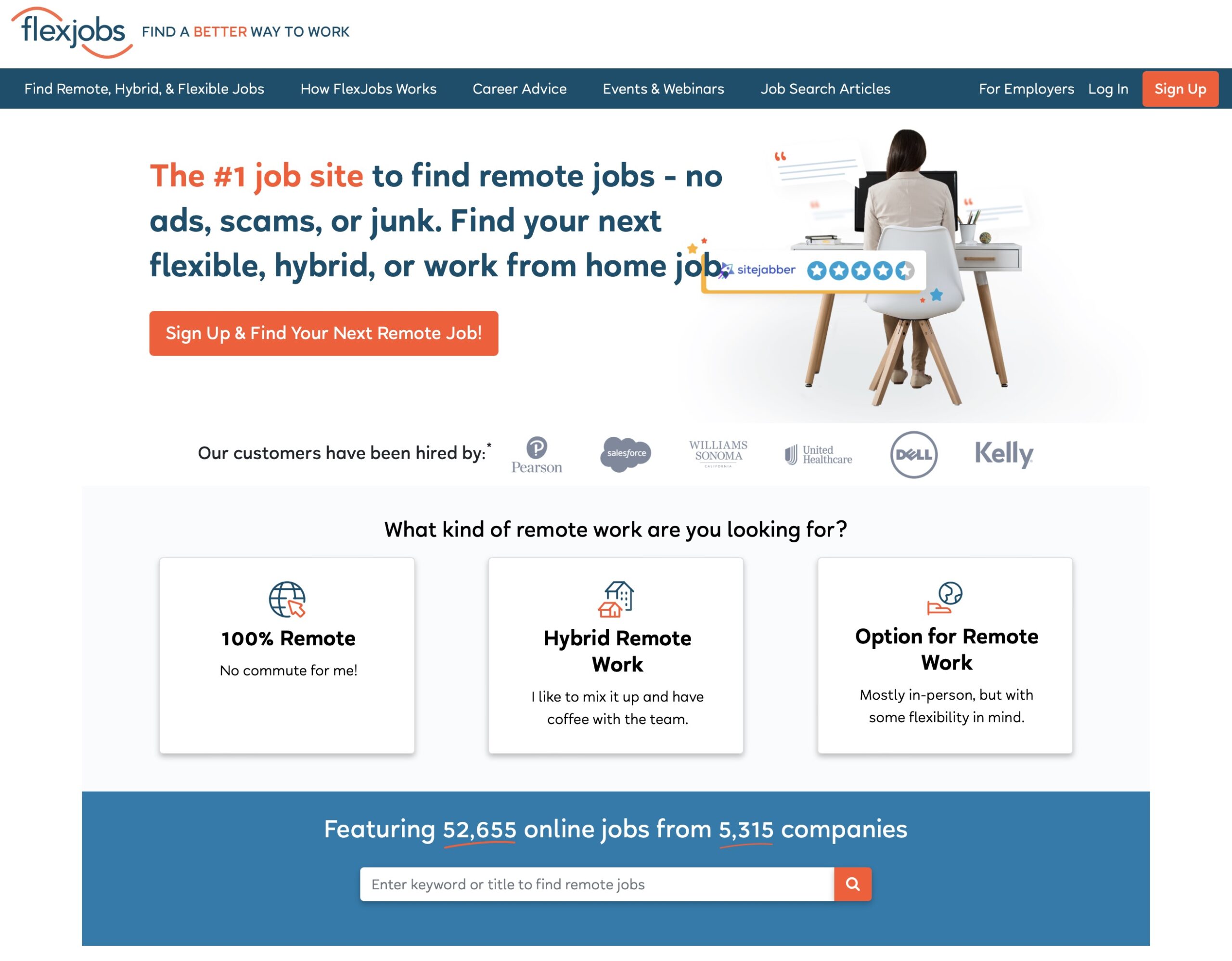
FlexJobs is an established remote job site featuring over 50 categories of pre-screened remote positions. Founded by Sara Sutton, who experienced firsthand the struggle of finding a remote opportunity with a flexible schedule, FlexJobs offers a curated selection of jobs ranging from software engineering and customer support to marketing roles. With over 20,000 remote job postings, you’ll have plenty of options.
What sets FlexJobs apart is:
Their rigorous vetting process, which weeds out fake job listings and scams, will give you peace of mind while you search for your next opportunity.
They offer a one-week trial starting at $9.95.
If you’re not satisfied, they provide a money-back guarantee.
FlexJobs offers a reliable starting point for your remote job search, free from dubious listings.
3. WeWorkRemotely
WeWorkRemotely is a popular remote job board serving over 130,000 monthly users with telecommuting opportunities. If you’re into programming, design, copywriting, sales, or marketing, this platform covers you. They focus on software engineering, digital marketing, and customer support roles, making it a go-to site for professionals in these fields.
In addition to their user-friendly interface for searching remote positions, WeWorkRemotely also offers valuable resources such as a remote job description template, insights on remote work trends, and a list of the top 100 remote companies. WeWorkRemotely allows you to secure your perfect job and acquire extensive insights into the remote work environment.
4. Dynamite Jobs
Dynamite Jobs is a remote job board established in 2017 to showcase unique jobs from companies with a remote-first approach.
The platform also serves as a marketplace for finding talent. Companies can browse the profiles and resumes of hundreds of thousands of candidates from various backgrounds, including web development, marketing, design, sales, project and product management, and more.
Dynamite Jobs has its own Application Tracking System (ATS) that allows companies and candidates to interact within the platform and also allows companies to manage their hiring pipeline.
Job seekers can access DJ for free, and companies can post jobs for 30 days starting at $399-645, depending on the various add-ons they choose to add to their jobs.
5. Remote Talent (Remote.com)
Remote Talent is the newest job board on this list, rolled out by Remote.com in November 2023. The distinct value of Remote Talent comes from its full integration with the Remote.com HR and EOR service. The benefits of this are:
- More exclusive jobs
The presence of the Remote Talent tool on the platform encourages existing Remote client companies to use this job board as their first port of call. - More international opportunities
Remote work does not always mean ‘work from anywhere.’ Compliance concerns often prevent companies from hiring internationally. However, as a global Employer of Record, Remote allows for onboarding talent in virtually any location.
6. HireBasis
HireBasis is a remote jobs platform that combines Skills-Based Hiring (SBH) with a Worldwide Remote Job Marketplace.
HireBasis advertises 200+ new job posts per week and has a global database of over 30,000 job candidates. Through job skills tests, candidates can highlight their proficiencies to potential employers.
The two standout features of HireBasis are:
Skill-based tests that let employers properly vet talent and allow candidates to showcase their best attributes.
Partnerships with popular Employers of Record, such as Horizons and Oyster, enable companies to quickly hire in countries without an existing legal entity or subsidiary.
WFH Conferences
As remote work continues to evolve and shape the future of business, several noteworthy events are scheduled for 2024. These events will focus on distributed work, workers’ rights, and integrating remote working strategies. Major events are being held in cities like New York and Las Vegas.
Here are three significant future-of-work conferences worth checking out every year:
Running Remote Conference: This premier event for remote-first and hybrid teams is renowned for bringing together industry leaders to discuss flexible work, company culture, scaling, and transitioning, among other topics. With over 50 experts sharing their insights, it’s a hub for learning about effectively managing remote-first and hybrid teams. The conference also includes a dedicated day for large corporations with flexible and hybrid teams, offering tailored solutions for distributed and hybrid teams at scale.
Future of Work Expo: Scheduled for February 13th-15th in Fort Lauderdale, Florida, this conference is set to delve into the changing nature of the workplace, emphasizing the blend of remote working and in-person interactions. It aims to provide actionable strategies covering various subjects, including remote work and employee experiences, with insights from leaders like Cisco and Twilio.
Following Practices Now: From March 25th-28th in Scottsdale, Arizona, this conference is touted as the #1 HR event for senior leaders. It focuses on the future of work, offering a platform to network with peers and learn about the following practices in human capital. Topics of discussion include work/life balance in hybrid work environments and the intersection of digital innovation and business transformation.
These events offer an excellent opportunity to network, gain insights, and learn best practices for navigating the challenges and opportunities of remote work.
Top Freelance Remote Job Platforms
If you’re more inclined toward freelance work, several freelance remote job platforms can help you find the perfect gig. These platforms connect freelancers with clients and offer remote job opportunities in various fields. From short-term projects to long-term contracts, these platforms have it all.
We’ll examine the leading freelance remote job platforms that could catalyze or expand your freelance career remotely. Whether you’re a developer, designer, writer, or a creative professional, these platforms have something for everyone.
1. Upwork
Upwork is a popular freelance platform that connects freelancers with clients looking for remote work projects in various industries. With millions of job postings available, you can find freelance opportunities in fields such as:
- Admin support
- Engineering & Architecture
- Sales & Marketing
- Customer service
To get started on Upwork, follow these steps:
Create a profile that showcases your skills and experience.
You can start applying for gigs that suit your expertise.
Offer custom services for employers looking to build the best virtual teams.
Upwork provides the flexibility to engage in diverse projects and cultivate a prosperous freelance career.
2. Fiverr
Fiverr is a unique freelance marketplace where users can list their services and wait for clients to approach them. It’s an ideal platform for creative professionals looking to offer their expertise in areas such as:
- Graphic design
- Writing
- Video editing
- Virtual assistance
The platform allows freelancers to set their prices and work on projects that interest them, providing a flexible and customizable experience. Whether you’re just starting your freelance journey or looking to expand your client base, Fiverr is an ideal platform to showcase your skills and locate remote work opportunities that complement them.
3. Freelancer
Freelancer.com is a sizeable freelancing platform with millions of remote job listings for various skill sets, including:
- Web development
- Graphic design
- Copywriting
- Data entry
As a global platform, Freelancer.com connects over 44 million employers and freelancers worldwide, providing many opportunities for remote work.
To start working on Freelancer.com, create an account, complete your profile, and apply for available freelance opportunities. With its vast array of job prospects and a safe payment system, Freelancer.com is an outstanding platform to discover remote jobs and expand your freelance career.
4. Toptal
Toptal is an exclusive freelance platform that caters to the top 3% of talent in software development, design, finance, project, and product management. To join Toptal, candidates must undergo a rigorous selection process involving tests to demonstrate their proficiency in their respective fields.
Once accepted into the platform, freelancers can access high-quality job opportunities and increased remuneration. If you’re confident in your skills and want to be part of an elite network of professionals, Toptal could be your ideal platform.
The Best Niche Remote Job Board In Each Specialty
If you’re a specialist in a specific industry and want to focus on remote job opportunities tailored to your expertise, niche remote job boards can be a great resource. These specialized job boards cater to professionals in specific fields, making it easier to find the perfect remote job that aligns with your skills and interests.
Let’s delve into some of the top niche remote job boards catering to specialists in various fields. Whether you’re a web designer, content writer, or a creative professional, these job boards can help you find remote work opportunities that match your unique skill set.
1. Authentic Jobs
Authentic Jobs is a job board that caters to web professionals, offering opportunities for designers, developers, and creative professionals. With filters for job field, job type, and location, you can easily find remote job listings that fit your preferences and expertise. Companies like Apple, Facebook, The New York Times, and Tesla have utilized Authentic Jobs to find talent, making it a reputable platform for remote work opportunities in the web industry.
Whether you’re looking for a full-time or freelance gig, Authentic Jobs is a valuable resource for web professionals seeking remote work.
2. ProBlogger
ProBlogger is a well-established platform that offers a remote job board for content writers and copywriters to locate freelance or full-time writing opportunities. Established in 2004, ProBlogger has provided valuable resources and information for bloggers seeking to create and grow their blogs professionally.
To make the most of ProBlogger, follow these steps:
- Create a profile that accurately portrays your abilities and experience.
- Carefully read the job postings to ensure you’re a suitable match.
- ProBlogger enables you to locate the ideal writing opportunity to propel your remote career in content creation.
3. Behance
Behance is the premier online platform for displaying and discovering creative work, utilized by creative professionals worldwide to showcase their portfolios. As part of Adobe, Behance provides remote job opportunities for:
- Graphic designers
- Illustrators
- Web designers
- Animators
- Video editors
By showcasing your work on Behance, you can increase your visibility to potential employers and find the perfect remote job opportunity tailored to your skills. If you’re a creative professional looking for remote work in the design industry, Behance should be on your list of platforms to visit.
Companies Actively Hiring Remote Workers
Instead of relying solely on remote job boards, as a job seeker, you can also explore companies actively hiring remote workers. By researching and applying directly to these companies, you can access more job opportunities, find a better match for your skills and preferences, and target companies that provide a great workplace!
Leading Remote Companies
- FlexJobs
- Liveops
- Working Solutions
- TTEC
- CVS Health
- Airbnb
- Aquent
- Axon
- BairesDev
- BCD Travel
- Beacon Hill Staffing Group
- Bright HealthCare
Keep an eye on these companies’ career pages to stay updated on their latest remote job openings.
Tips for Remote Job Seekers
To increase your chances of securing a remote job, be proactive in your search and always do the following: tailor your resume and cover letter to the job, follow the application instructions, and reach out to the employer for follow-up.
As remote job seekers, be cautious of WFH sites that advertise fraudulent job postings and other deceptive activities. Stick to reputable remote job sites like FlexJobs, WeWorkRemotely, Dynamite Jobs, and Remote.co.
- For specialist positions, such as those seeking tech jobs/software development roles, begin with niche job boards or platforms. This is where the best companies are likely to look for highly-skilled talent.
- General remote job platforms would be the best bet for those after WFH jobs, where the role could be more critical.
- For digital nomads/working nomads, freelancer marketplaces can be a great option as freelance gigs offer the most flexible work option for professionals in unusual or changeable time zones.
When researching job requirements, consider the following:
- Job title
- Job description
- Requisite skills
- Qualifications
Make sure your professional profile accurately portrays your abilities and experience, and showcase your portfolio to potential employers.
Adhering to these tips will set you on the path to finding remote jobs and securing your perfect remote job.
Remote Work Trends and Statistics
Remote work is experiencing rapid growth, with 99 percent of people surveyed indicating a preference for working remotely. The appeal of remote positions has recently increased due to factors such as the economic downturn, numerous job losses, and potential health risks posed by COVID-19.
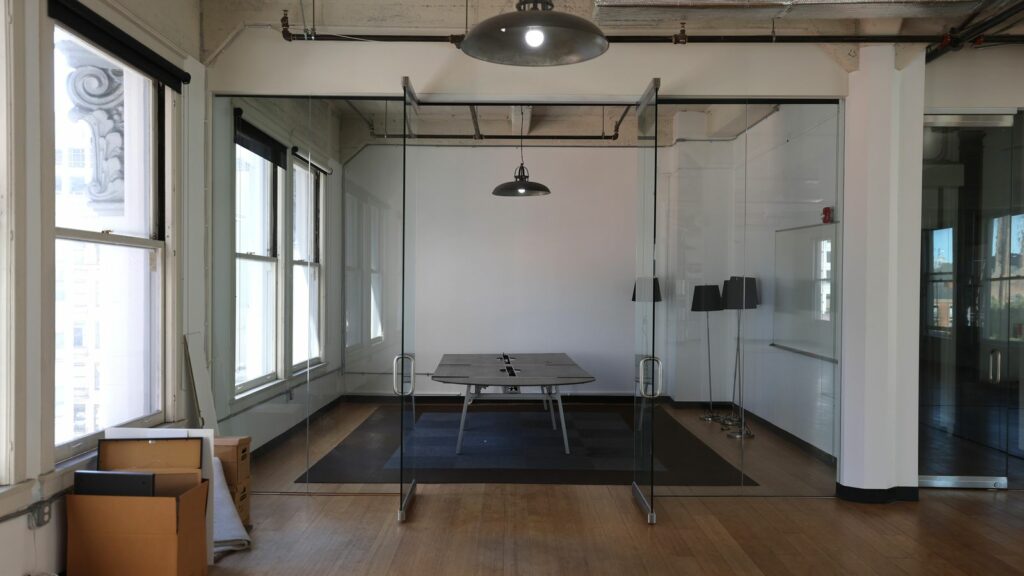
A Harris Poll survey revealed that approximately three-fifths of businesses providing remote work have experienced a beneficial effect on their organization. As remote work continues to gain traction, it’s clear that the future of work lies in the flexibility and freedom that remote positions offer.
So, are you prepared to adapt to this evolving work model and discover your dream remote job?
How to Find the Best Remote Jobs
We’ve explored the best remote job sites, freelance platforms, niche job boards, and top companies actively hiring remote workers, from entry-level to expert level, providing a comprehensive guide to finding remote work in 2024. With the remote work landscape constantly evolving and plenty of signs of more to come, staying informed and adapting to the changes is essential.
More Tips for Effective Remote Job Searching
Update your resume highlighting remote work skills, experiences, and contract preferences.
Expand your network through professional platforms and remote work communities.
Research companies with remote-friendly policies aligned with your preferences.
Develop essential remote work skills like time organization and virtual communication.
Create a robust online presence showcasing your expertise and professionalism.
Stay organized using tools like spreadsheets to manage job applications and deadlines.
Prepare for virtual interviews by familiarizing yourself with common platforms and minimizing distractions.
Be flexible in considering various remote work arrangements and schedules.
Follow up promptly after interviews or applications to express continued interest.
Stay persistent and optimistic throughout the remote job searching, celebrating small victories and maintaining resilience.
Whether you’re a software engineer, creative professional, or specialist in a specific industry, a remote job opportunity is waiting for you. Embrace the flexibility and freedom that remote work offers, and embark on your journey to finding your dream remote job today!
FAQ
Since the onset of the COVID-19 pandemic a few years ago, more and more companies have begun allowing employees to work remotely. As many as 37.5% of companies have increased their remote working allowances since 2020 – and 56.8% of teams now work remotely at least some of the time.
So, what does it mean to work remotely? Whether you’ve heard these jobs called “at-home work,” “telecommuting,” or “virtual careers,” many people are now enjoying some level of work-from-home benefits in their careers. Remote jobs allow you to complete your work from an environment outside of the traditional office.
While the pandemic spurred the current work-from-home craze, remote work has been possible for a long time. It’s only now, however, becoming more mainstream. The mentality behind remote work is that many job-related tasks do not need to be done in a traditional office environment to be successful.
Additionally, a work-from-home component is becoming an attractive benefit for many companies when attracting and retaining talented employees. Here’s the thing: People who can work remotely feel overwhelmingly positive about it. As many as 97% of remote workers want to work remotely in some capacity for the rest of their careers.
With this in mind, many companies are shifting their models to allow remote work. In one survey on remote work with just over 2,000 respondents, 72% of people reported that their employers had plans to allow some form of remote work going forward.
It’s important to note, however, that remote work means different things at every company. While some companies are fully remote and allow employees to work from anywhere, those businesses are in the minority – most remote work opportunities today involve some location requirements, and many offer hybrid, in-person, and remote schedules.
A common misconception about remote work is that “work from home” means “work from anywhere.” That’s not the case. About 95% of remote job listings necessitate that employees be based in a specific location. In other words, only 5% of remote positions are actual “work from anywhere” careers. You’re probably wondering why this is.
There are numerous reasons why an employer might require remote workers to be based in a specific location (a state, a region, a country, or a time zone). Employers must consider factors like tax issues, travel requirements, availability for on-site training or meetings, professional licensing, and proximity to clients when deciding where to allow their employees to work.
For instance, an employer based in Maryland but looking at an applicant has to pay additional California national fees to add that person to their payroll and withhold the appropriate taxes. Plus, since many employers are now encouraging (or requiring) employees to come into the office occasionally, it’s helpful to hire people who live nearby.
In general, there are four categories of remote jobs when it comes to location requirements:
- U.S.-based jobs can typically be done from anywhere within the country and are often fully remote or require only monthly or quarterly visits to the office.
- Country-specific jobs are based internationally but must be completed within the country.
- City- or state-based jobs require employees to be located in a specific area of the U.S. (for example, you might have to work from the greater Boston area, the state of New York, or the Southwest region of the country).
- Work-from-anywhere jobs are those select few positions that can be completed from anywhere in the world, with no location restrictions. These jobs are typically fully remote and offer flexible hours.
If you’re looking to live the life of a digital nomad, taking your work with you anywhere and checking the compliance rules that apply to a potential employer is essential. Even jobs that don’t require you to go into the office may still require that you live in and work from a particular area to meet licensure standards, tax requirements, and other considerations.
It's also crucial that for every location an employee relocates to, they have a valid work visa or digital nomad visa permitting them to work there.
Jobs that are billed as “remote” might not actually be fully remote 100% of the time. It’s important to understand the different classifications of remote jobs so that you know what you’re signing up for ahead of time.
1. Fully remote
Jobs that are fully remote allow you to work from home all of the time. These jobs do not include any in-office time or regular travel expectations. Of course, they may still have location requirements in terms of where you can conduct your remote work.
2. Hybrid
Jobs that are classified as hybrid usually involve some work-from-home time and some time working in the office or traveling. For example, a hybrid job might ask you to spend two days per week in the office and allow you to spend the other three days working from home. Other hybrid schedules could include week-on-week-off schedules or half-days in the office.
3. Remote-friendly
Some jobs are described as “remote-friendly,” a term that implies the job allows for remote work but with restrictions. These jobs typically expect employees to be working in the office most of the time, but allow for some flexibility to support remote work. For instance, you may be able to work from home if you’re sick or traveling.
Most office jobs can be done at least partly remotely, but there are certain fields in which remote work is especially popular. Areas like IT support, software development, marketing, and sales are just a few of the job types that are seeing lots of remote growth.
So why are these fields seeing especially high rates of remote work? Well, any professional who is able to do their job through the use of technology may be able to thrive with a remote work schedule. Let’s take a look at the software development example: developers are typically able to do their jobs well as long as they have access to the computer. You don’t need to be in the office for that!
Likewise, new technological advancements have allowed IT professionals to work outside the office. Remote management tools and project management systems have allowed IT departments to efficiently and effectively manage off-site ticketing.
The marketing and sales fields have also shifted more and more toward digital tools, including SaaS (software as a service) products like automated CRM (customer relationship management) tools and internet-based marketing and design products. These tools have allowed marketers and salespeople to perform strongly while working from home.
Many different careers and industries now offer at least some work-from-home components to their jobs. No matter what field you’re in, there are likely opportunities out there. And when it comes to working remotely, most employees see a host of attractive benefits.
The biggest benefit of remote work cited by employees was flexibility: to live where you choose, to decide how to spend your time, and to maximize your career options. When employees have flexible schedules, they can work during their most productive times of day.
This is an especially attractive benefit for parents, who often use their remote job flexibility to spend more time with their children and attend their activities when possible. Of the surveyed working parents, 76% said they appreciated the flexibility of remote work for that very reason. People with chronic illnesses also benefited from this flexibility.
Many people additionally mentioned saving time as a benefit of remote work. By getting rid of the typical morning and evening commute, some employees are able to gain back hours of their days that would have been spent in bumper-to-bumper traffic.
Remote workers tended to see better health and wellness – including mental health. Plus, some reported finding a renewed passion for their job that they found when they were able to select their own working environment, filtering out distractions as they desired.
There are also benefits to promoting remote work from an employer’s point of view. While some people question the productivity of remote employees, two-thirds of managers who oversaw work from remote employees reported higher levels of productivity. In addition to the productivity and efficiency factor, companies may also save money by allowing remote work.
If a business doesn’t need an office space – or can downsize from an existing one – they can save on overhead incurred from costs like rent or office furniture. If employees are only coming in some days out of the week, they may not need as much space or amenities in the office as they once had.
In addition, businesses that offer remote schedules (whether 100% remote, hybrid, or remote-friendly) often have an easier time finding and retaining employees. Some degree of opportunity to work remotely is becoming an in-demand feature on job postings, and many employees prefer to work somewhere that has some level of flexibility.
Of course, there is a flip side to this coin. Remote work offers many attractive businesses, but it can come with a few important downsides as well. The two most commonly reported struggles that remote workers faced were not being able to “unplug” from work and feeling lonely.
Some people struggle with transitioning out of the mindset of work at the end of the day. This can be especially challenging when your work life and your home life take place in the same location – in this case, your own home. It can be difficult to separate your day in terms of work time and non-work time when your desk and your computer are always available.
In terms of social struggles, making friends at an in-person job can be much easier than building friendships through a screen. The proximity factor isn’t going to do much for you, and there won’t be any water cooler banter to get you through the day. While it can be more challenging to foster interpersonal connections with your coworkers, some companies are clustering employees around urban hubs in order to foster out-of-work socialization.
For any companies introducing remote work, it is crucial that the company consider the best way to introduce a strong remote work culture to mitigate some of these potential downsides.
Whether or not a remote job is right for you depends on your own personal preferences as well as your financial and lifestyle priorities. If you want or need a flexible schedule and highly value the freedom of working in your own home, looking into a remote job may be the right move. Remote work comes with plenty of benefits, including boosts to your mental health and saving time that you would have spent commuting.
For many individuals, remote jobs offer much-needed flexibility that’s needed to juggle the various other responsibilities of adult life. There are some cases, however, in which a remote job may not be the right fit.
If you’re especially prone to loneliness or highly value the in-person social interactions that take place each day in a traditional office environment, you may prefer an in-person position. You also might enjoy traveling to a physical location if you have trouble unplugging from the demands of work each night.
The right job for you all depends on what you want to prioritize. Remote work certainly allows for plenty of flexibility, but it can have disadvantages too, depending on your preferences and your priorities.
You can be a banker remotely - many companies offer remote or hybrid work for banking jobs. You'll need a quiet space, a phone, computer and good wifi to do your job, and may get the same training and opportunities for growth as non-remote bank team members. Remote banking jobs can be a great way to work from home and still have a career in banking. You'll need to be organized and have the right tools to be successful,
Increase your chances of securing a remote job by tailoring your resume and cover letter, following instructions, reaching out to the employer, using reputable job sites, and being proactive.
Remote work opportunities are indeed on the rise, with an increasing number of people embracing this flexible working style and employers recognizing its advantages.


